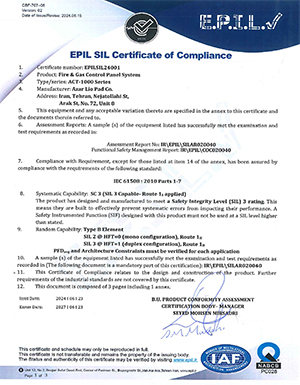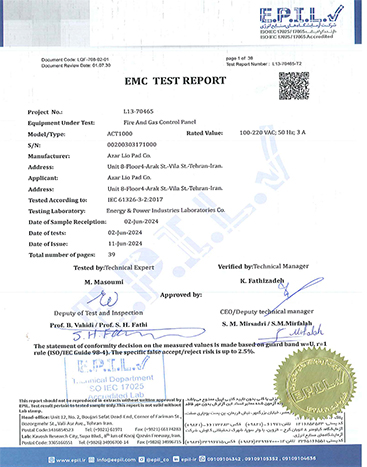In the realm of industrial safety, achieving high standards for fire and gas (F&G) systems is crucial. One of the most critical benchmarks in this area is the Safety Integrity Level (SIL) certification. Specifically, SIL3 certification represents a high level of reliability and safety. This article explores the effects of SIL3 certification on F&G systems and why it is vital for ensuring maximum safety in hazardous environments.
Understanding SIL3 Certification
SIL3 is part of the IEC 61508 standard, which defines four levels of safety integrity, with SIL4 being the highest. Achieving SIL3 certification indicates that a system has a probability of failure on demand (PFD) between 10⁻³ and 10⁻⁴, meaning the system is extremely reliable and will fail very infrequently. This is particularly important for F&G systems, where any failure could lead to catastrophic consequences.
Effects of SIL3 Certification on F&G Systems
Enhanced Safety Assurance
- SIL3 F&G System certification ensures that F&G system meet rigorous safety standards, reducing the risk of failure in critical situations. This is particularly important in industries such as oil and gas, chemical processing, and other hazardous environments where safety is paramount.
Compliance with Regulatory Requirements
- Many industries are subject to strict safety regulations. Achieving SIL3 certification helps companies comply with these regulations, avoiding potential fines and ensuring that their operations are legally sound.
Increased Confidence Among Stakeholders
- SIL3 certification can boost confidence among stakeholders, including employees, clients, and insurers. It demonstrates a commitment to safety and can lead to better business opportunities, as companies are seen as more reliable and responsible.
Reduction in Operational Risks
- By ensuring that SIL3 F&G Control Panel are highly reliable, SIL3 certification reduces operational risks. This can lead to fewer incidents, lower insurance premiums, and overall improved operational efficiency.
Conclusion
Achieving SIL3 certification for F&G systems is a significant investment in safety and reliability. It not only helps organizations comply with regulatory requirements but also enhances safety assurance, boosts stakeholder confidence, and reduces operational risks. As industrial safety becomes increasingly critical, SIL3 certification will continue to be a key factor in ensuring the safety of hazardous environments.
The Importance of IS Approval for Fire and Gas Systems
Introduction
Intrinsic Safety (IS) approval is a fundamental aspect of ensuring that fire and gas (F&G) systems operate safely in hazardous environments. IS approval certifies that electrical equipment is safe to use in explosive atmospheres, making it a critical consideration for industries such as oil and gas, chemical processing, and mining. This article delves into the importance of IS approval for F&G systems and the benefits it brings to industrial safety.
What is Intrinsic Safety (IS)?
Intrinsic Safety is a protection technique that limits the energy, both electrical and thermal, available for ignition in hazardous areas. IS-approved devices are designed to be safe even in the presence of flammable gases, dust, or fibers, preventing explosions or fires.
Effects of IS Approval on F&G Systems
Enhanced Safety in Hazardous Areas
- IS approval ensures that F&G systems can operate safely even in explosive atmospheres. This is essential in industries where the presence of flammable materials makes the environment extremely dangerous.
Compliance with Safety Standards
- Intrinsic Safety approval is often required to comply with international safety standards, such as ATEX and IECEx. These certifications are mandatory in many regions and industries, making IS approval crucial for legal compliance.
Reduced Risk of Explosions
- By limiting the energy available for ignition, IS-approved F&G systems significantly reduce the risk of explosions. This not only protects lives but also minimizes potential damage to equipment and infrastructure.
Long-Term Cost Savings
- Although achieving IS approval may require an upfront investment, the long-term benefits include reduced risk of incidents, lower insurance costs, and fewer regulatory fines. These factors contribute to significant cost savings over time.
Conclusion
Intrinsic Safety approval is a critical requirement for F&G systems operating in hazardous environments. It ensures compliance with safety standards, reduces the risk of explosions, and enhances overall safety. As industries continue to prioritize safety, IS approval will remain a key factor in the safe operation of fire and gas systems.


